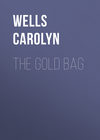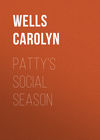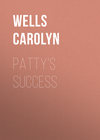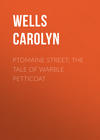Kitabı oku: «The Gold Bag», sayfa 10
“Not likely. If the owner of that bag—a woman, presumably—is the slayer of Joseph Crawford, and made her escape from the scene undiscovered, she is not likely to stay around where she may be found. And the bag itself, and its contents, are hopelessly unindividual.”
“They are that,” I agreed. “Not a thing in it that mightn’t be in any woman’s bag in this country. To me, that cleaner’s advertisement means nothing in connection with Miss Lloyd.”
“I am glad to hear you say that, Mr. Burroughs. I confess I have had a half-fear that your suspicions had a trend in Florence’s direction, and I assure you, sir, that girl is incapable of the slightest impulse toward crime.”
“I’m sure of that,” I said heartily, my blood bounding in my veins at an opportunity to speak in defense of the woman I loved. “But how if her impulses were directed, or even coerced, by another?”
“Just what do you mean by that?”
“Oh, nothing. But sometimes the best and sweetest women will act against their own good impulses for those they love.”
“I cannot pretend to misunderstand you,” said Mr. Porter. “But you are wrong. If the one you have in mind—I will say no name—was in any way guiltily implicated, it was without the knowledge or connivance of Florence Lloyd. But, man, the idea is absurd. The individual in question has a perfect alibi.”
“He refuses to give it.”
“Refuses the details, perhaps. And he has a right to, since they concern no one but himself. No, my friend, you know the French rule; well, follow that, and search for the lady with the gold-mesh bag.”
“The lady without it, at present,” I said, with an apologetic smile for my rather grim jest.
“Yes; and that’s the difficulty. As she hasn’t the bag, we can’t discover her. So as a clue it is worthless.”
“It seems to be,” I agreed.
I thought best not to tell Mr. Porter of the card I had found in the bag, for I hoped soon to hear from headquarters concerning the lady whose name it bore. But I told him about the photograph I had found in Mr. Crawford’s desk, and showed it to him. He did not recognize it as being a portrait of any one he had ever seen. Nor did he take it very seriously as a clue.
“I’m quite sure,” he said, “that Joseph Crawford has not been interested in any woman since the death of his wife. He has always seemed devoted to her memory, and as one of his nearest friends, I think I would have known if he had formed any other attachment. Of course, in a matter like this, a man may well have a secret from his nearest friends, but I cannot think this mild and gentle-looking lady is at all concerned in the tragedy.”
As a matter of fact, I agreed with Mr. Porter, for nothing I had discovered among the late Mr. Crawford’s effects led me to think he had any secret romance.
After Mr. Porter’s departure I studied long over my puzzles, and I came to the conclusion that I could do little more until I should hear from headquarters.
XV. THE PHOTOGRAPH EXPLAINED
That evening I went to see Philip Crawford. As one of the executors of his late brother’s estate, and as probable heir to the same, he was an important personage just now.
He seemed glad to see me, and glad to discuss ways and means of running down the assassin. Like Mr. Porter, he attached little importance to the gold bag.
“I can’t help thinking it belongs to Florence,” he said. “I know the girl so well, and I know that her horrified fear of being in any way connected with the tragedy might easily lead her to, disown her own property, thinking the occasion justified the untruth. That girl has no more guilty knowledge of Joseph’s death than I have, and that is absolutely none. I tell you frankly, Mr. Burroughs, I haven’t even a glimmer of a suspicion of any one. I can’t think of an enemy my brother had; he was the most easy-going of men. I never knew him to quarrel with anybody. So I trust that you, with your detective talent, can at least find a clue to lead us in the right direction.”
“You don’t admit the gold bag as a clue, then?” I asked.
“Nonsense! No! If that were a clue, it would point to some woman who came secretly at night to visit Joseph. My brother was not that sort of man, sir. He had no feminine acquaintances that were unknown to his relatives.”
“That is, you suppose so.”
“I know it! We have been brothers for sixty years or more, and whatever Joseph’s faults, they did not lie in that direction. No, sir; if that bag is not Florence’s, then there is some other rational and commonplace explanation of its presence there.”
“I’m glad to hear you speak so positively, Mr. Crawford, as to your brother’s feminine acquaintances. And in connection with the subject, I would like to show you this photograph which I found in his desk.”
I handed the card to Mr. Crawford, whose features broke into a smile as he looked at it.
“Oh, that,” he said; “that is a picture, of Mrs. Patton.” He looked at the picture with a glance that seemed to be of admiring reminiscence, and he studied the gentle face of the photograph a moment without speaking.
Then he said, “She was beautiful as a girl. She used to be a school friend of both Joseph and myself.”
“She wrote rather an affectionate message on the back,” I observed.
Mr. Crawford turned the picture over.
“Oh, she didn’t send this picture to Joseph. She sent it to my wife last Christmas. I took it over to show it to Joseph some months ago, and left it there without thinking much about it. He probably laid it in his desk without thinking much about it, either. No, no, Burroughs, there is no romance there, and you can’t connect Mrs. Patton with any of your detective investigations.”
“I rather thought that, Mr. Crawford; for this is evidently a sweet, simple-minded lady, and more over nothing has turned up to indicate that Mr. Crawford had a romantic interest of any kind.”
“No, he didn’t. I knew Joseph as I know myself. No; whoever killed my brother, was a man; some villain who had a motive that I know nothing about.”
“But you were intimately acquainted with your brother’s affairs?”
“Yes, that is what proves to me that whoever this assassin was, it was some one of whose motive I know nothing. The fact that my brother was murdered, proves to me that my brother had an enemy, but I had never suspected it before.”
“Do you know a Mrs. Egerton Purvis?”
I flung the question at him, suddenly, hoping to catch him unawares. But he only looked at me with the blank expression of one who hears a name for the first time.
“No,” he answered, “I never heard of her. Who is she?”
“Well, when I was hunting through that gold-mesh bag, I discovered a lady’s visiting card with that name on it. It had slipped between the linings, and so had not been noticed before.”
To my surprise, this piece of information seemed to annoy Mr. Crawford greatly.
“No!” he exclaimed. “In the bag? Then some one has put it there! for I looked over all the bag’s contents myself.”
“It was between the pocket and the lining,” said I; “it is there still, for as I felt sure no one else would discover it, I left it there. Mr. Goodrich has the bag.”
“Oh, I don’t want to see it,” he exclaimed angrily. “And I tell you anyway, Mr. Burroughs, that bag is worthless as a clue. Take my advice, and pay no further attention to it.”
I couldn’t understand Mr. Crawford’s decided attitude against the bag as a clue, but I dropped the subject, for I didn’t wish to tell him I had made plans to trace up that visiting card.
“It is difficult to find anything that is a real clue,” I said.
“Yes, indeed. The whole affair is mysterious, and, for my part, I cannot form even a conjecture as to who the villain might have been. He certainly left no trace.”
“Where is the revolver?” I said, picturing the scene in imagination.
Philip Crawford started as if caught unawares.
“How do I know?” he cried, almost angrily. “I tell you, I have no suspicions. I wish I had! I desire, above all things, to bring my brother’s murderer to justice. But I don’t know where to look. If the weapon were not missing, I should think it a suicide.”
“The doctor declares it could not have been suicide, even if the weapon had been found near him. This they learned from the position of his arms and head.”
“Yes, yes; I know it. It was, without doubt, murder. But who—who would have a motive?”
“They say,” I observed, “motives for murder are usually love, revenge, or money.”
“There is no question of love or revenge in this instance. And as for money, as I am the one who has profited financially, suspicion should rest on me.”
“Absurd!” I said.
“Yes, it is absurd,” he went on, “for had I desired Joseph’s fortune, I need not have killed him to acquire it. He told me the day before he died that he intended to disinherit Florence, and make me his heir, unless she broke with that secretary of his. I tried to dissuade him from this step, for we are not a mercenary lot, we Crawfords, and I thought I had made him reconsider his decision. Now, as it turns out, he persisted in his resolve, and was only prevented from carrying it out by this midnight assassin. We must find that villain, Mr. Burroughs! Do not consider expense; do anything you can to track him down.”
“Then, Mr. Crawford,” said I, “if you do not mind the outlay, I advise that we send for Fleming Stone. He is a detective of extraordinary powers, and I am quite willing to surrender the case to him.”
Philip Crawford eyed me keenly.
“You give up easily, young man,” he said banteringly.
“I know it seems so,” I replied, “but I have my reasons. One is, that Fleming Stone makes important deductions from seemingly unimportant clues; and he holds that unless these clues are followed immediately, they are lost sight of and great opportunities are gone.”
“H’m,” mused Philip Crawford, stroking his strong, square chin. “I don’t care much for these spectacular detectives. Your man, I suppose, would glance at the gold bag, and at once announce the age, sex, and previous condition of servitude of its owner.”
“Just what I have thought, Mr. Crawford. I’m sure he could do just that.”
“And that’s all the good it would do! That bag doesn’t belong to the criminal.”
“How do you know?”
“By common-sense. No woman came to the house in the dead of night and shot my brother, and then departed, taking her revolver with her. And again, granting a woman did have nerve and strength enough to do that, such a woman is not going off leaving her gold bag behind her as evidence!”
This speech didn’t affect me much. It was pure conjecture. Women are uncertain creatures, at best; and a woman capable of murder would be equally capable of losing her head afterward, and leaving circumstantial evidence behind her.
I was sorry Mr. Crawford didn’t seem to take to the notion of sending for Stone. I wasn’t weakening in the case so far as my confidence in my own ability was concerned; but I could see no direction to look except toward Florence Lloyd or Gregory Hall, or both. And so I was ready to give up.
“What do you think of Gregory Hall?” I said suddenly.
“As a man or as a suspect?” inquired Mr. Crawford.
“Both.”
“Well, as a man, I think he’s about the average, ordinary young American, of the secretary type. He has little real ambition, but he has had a good berth with Joseph, and he has worked fairly hard to keep it. As a suspect, the notion is absurd. He wasn’t even in West Sedgwick.”
“How do you know?”
“Because he went away at six that evening, and was in New York until nearly noon the next day.”
“How do you know?”
Philip Crawford stared at me.
“He says so,” I went on; “but no one can prove his statement. He refuses to say where he was in New York, or what he did. Now, merely as a supposition, why couldn’t he have come out here—say on the midnight train—called on Mr. Joseph Crawford, and returned to New York before daylight?”
“Absurd! Why, he had no motive for killing Joseph.”
“He had the same motive Florence would have. He knew of Mr. Crawford’s objection to their union, and he knew of his threat to change his will. Mr. Hall is not blind to the advantages of a fortune.”
“Right you are, there! In fact, I always felt he was marrying Florence for her money. I had no real reason to think this, but somehow he gave me that impression.”
“Me, too. Moreover, I found a late extra of a New York paper in Mr. Crawford’s office. This wasn’t on sale until about half past eleven that night, so whoever left it there must have come out from the city on that midnight train, or later.”
A change came over Philip Crawford’s face. Apparently he was brought to see the whole matter in a new light.
“What? What’s that?” he cried excitedly, grasping his chair-arms and half rising. “A late newspaper! An extra!”
“Yes; the liner accident, you know.”
“But—but—Gregory Hall! Why man, you’re crazy! Hall is a good fellow. Not remarkably clever, perhaps, and a fortune-hunter, maybe, but not—surely not a murderer!”
“Don’t take it so hard, Mr. Crawford,” I broke in. “Probably. Mr. Hall is innocent. But the late paper must have been left there by some one, after, say, one o’clock.”
“This is awful! This is terrible!” groaned the poor man, and I couldn’t help wondering if he had some other evidence against Hall that this seemed to corroborate.
Then, by an effort, he recovered himself, and began to talk in more normal tones.
“Now, don’t let this new idea run away with you, Mr. Burroughs,” he said. “If Hall had an interview with my brother that night, he would have learned from him that he intended to make a new will, but hadn’t yet done so.”
“Exactly; and that would constitute a motive for putting Mr. Crawford out of the way before he could accomplish his purpose.”
“But Joseph had already destroyed the will that favored Florence.”
“We don’t know that,” I responded gravely. “And, anyway, if he had done so, Mr. Hall didn’t know it. This leaves his motive unchanged.”
“But the gold bag,” said Mr. Crawford, apparently to get away—from the subject of Gregory Hall.
“If, as you say,” I began, “that is Florence’s bag—”
I couldn’t go on. A strange sense of duty had forced those words from me, but I could say no more.
Fleming Stone might take the case if they wanted him to; or they might get some one else. But I could not go on, when the only clues discoverable pointed in a way I dared not look.
Philip Crawford was ghastly now. His face was working and he breathed quickly.
“Nonsense, Dad!” cried a strong, young voice, and his son, Philip, Jr., bounded into the room and grasped his father’s hands. “I overheard a few of your last words, and you two are on the wrong track. Florrie’s no more mixed up in that horrible business than I am. Neither is Hall. He’s a fool chap, but no villain. I heard what you said about the late newspaper, but lots of people come out on that midnight train. You may as well suspect some peaceable citizen coming home from the theatre, as to pick out poor Hall, without a scrap of evidence to point to him.”
I was relieved beyond all words at the hearty assurance of the boy, and I plucked up new courage. Apprehension had made me faint-hearted, but if he could show such flawless confidence in Florence and her betrothed, surely I could do as much.
“Good for you, young man!” I cried, shaking his hand. “You’ve cheered me up a lot. I’ll take a fresh start, and surely we’ll find out something. But I’d like to send for Stone.”
“Wait a bit, wait a bit,” said Mr. Crawford. “Phil’s right; there’s no possibility of Florrie or Hall in the matter. Leave the gold bag, the newspapers, and the yellow posies out of consideration, and go to work in some sensible way.”
“How about Mr. Joseph’s finances?” I asked. “Are they in satisfactory shape?”
“Never finer,” said Philip Crawford. “Joseph was a very rich man, and all due to his own clever and careful investments. A bit of a speculator, but always on the right side of the market. Why, he fairly had a corner in X.Y. stock. Just that deal—and it will go through in a few days—means a fortune in itself. I shall settle that on Florence.”
“Then you think the will will never be found?” I said.
Mr. Crawford looked a little ashamed, as well he might, but he only said,
“If it is, no one will be more glad than I to see Florrie reinstated in her own right. If no will turns up, Joe’s estate is legally mine, but I shall see that Florence is amply provided for.”
He spoke with a proud dignity, and I was rather sorry I had caught him up so sharply.
I went back to the inn, and, after vainly racking my brain over it all for a time, I turned in, but to a miserably broken night’s rest.
XVI. A CALL ON MRS. PURVIS
The next morning I received information from headquarters. It was a long-code telegram, and I eagerly deciphered it, to learn that Mrs. Egerton Purvis was an English lady who was spending a few months in New York City. She was staying at the Albion Hotel, and seemed to be in every way above suspicion of any sort.
Of course I started off at once to see Mrs. Purvis.
Parmalee came just as I was leaving the inn, and was of course anxious and inquisitive to know where I was going, and what I was going to do.
At first I thought I would take him into my confidence, and I even thought of taking him with me. But I felt sure I could do better work alone. It might be that Mrs. Egerton Purvis should turn out to be an important factor in the case, and I suppose it was really an instinct of vanity that made me prefer to look her up without Parmalee by my side.
So I told him that I was going to New York on a matter in connection with the case, but that I preferred to go alone, but I would tell him the entire result of my mission as soon as I returned. I think he was a little disappointed, but he was a good-natured chap, and bade me a cheerful goodby, saying he would meet me on my return.
I went to New York and went straight to the Albion Hotel.
Learning at the desk that the lady was really there, I sent my card up to her with a request for an immediate audience, and very soon I was summoned to her apartment.
She greeted me with that air of frigid reserve typical of an English woman. Though not unattractive to look at, she possessed the high cheekbones and prominent teeth which are almost universal in the women of her nation. She was perhaps between thirty and forty years old, and had the air of a grande dame.
“Mr. Burroughs?” she said, looking through her lorgnon at my card, which she held in her hand.
“Yes,” I assented, and judging from her appearance that she was a woman of a decided and straightforward nature I came at once to the point.
“I’m a detective, madam,” I began, and the remark startled her out of her calm.
“A detective!” she cried out, with much the same tone as if I had said a rattlesnake.
“Do not be alarmed, I merely state my profession to explain my errand.”
“Not be alarmed! when a detective comes to see me! How can I help it? Why, I’ve never had such an experience before. It is shocking! I’ve met many queer people in the States, but not a detective! Reporters are bad enough!”
“Don’t let it disturb you so, Mrs. Purvis. I assure you there is nothing to trouble you in the fact of my presence here, unless it is trouble of your own making.”
“Trouble of my own making!” she almost shrieked. “Tell me at once what you mean, or I shall ring the bell and have you dismissed.”
Her fear and excitement made me think that perhaps I was on the track of new developments, and lest she should carry out her threat of ringing the bell, I plunged at once into the subject.
“Mrs. Purvis, have you lost a gold-mesh bag?” I said bluntly.
“No, I haven’t,” she snapped, “and if I had, I should take means to recover it, and not wait for a detective to come and ask me about it.”
I was terribly disappointed. To be sure she might be telling a falsehood about the bag, but I didn’t think so. She was angry, annoyed, and a little frightened at my intrusion, but she was not at all embarrassed at my question.
“Are you quite sure you have not lost a gold-link bag?” I insisted, as if in idiotic endeavor to persuade her to have done so.
“Of course I’m sure,” she replied, half laughing now; “I suppose I should know it if I had done so.”
“It’s a rather valuable bag,” I went on, “with a gold frame-work and gold chain.”
“Well, if it’s worth a whole fortune, it isn’t my bag,” she declared; “for I never owned such a one.”
“Well,” I said, in desperation, “your visiting card is in it.”
“My visiting card!” she said, with an expression of blank wonderment. “Well, even if that is true, it doesn’t make it my bag. I frequently give my cards to other people.”
This seemed to promise light at last. Somehow I couldn’t doubt her assertion that it was not her bag, and yet the thought suddenly occurred to me if she were clever enough to be implicated in the Crawford tragedy, and if she had left her bag there, she would be expecting this inquiry, and would probably be clever enough to have a story prepared.
“Mrs. Purvis, since you say it is not your bag, I’m going to ask you, in the interests of justice, to help me all you can.”
“I’m quite willing to do so, sir. What is it you wish to know?”
“A crime has been committed in a small town in New Jersey. A gold-link bag was afterward discovered at the scene of the crime, and though none of its other contents betokened its owner, a visiting card with your name on it was in the bag.”
Becoming interested in the story, Mrs. Purvis seemed to get over her fright, and was exceedingly sensible for a woman.
“It certainly is not my bag, Mr. Burroughs, and if my card is in it, I can only say that I must have given that card to the lady who owns the bag.”
This seemed distinctly plausible, and also promised further information.
“Do you remember giving your card to any lady with such a bag?”
Mrs. Purvis smiled. “So many of your American women carry those bags,” she said; “they seem to be almost universal this year. I have probably given my card to a score of ladies, who immediately put it into just such a bag.”
“Could you tell me who they are?”
“No, indeed;” and Mrs. Purvis almost laughed outright, at what was doubtless a foolish question.
“But can’t you help me in any way?” I pleaded.
“I don’t really see how I can,” she replied. “You see I have so many friends in New York, and they make little parties for me, or afternoon teas. Then I meet a great many American ladies, and we often exchange cards. But we do it so often that of course I can’t remember every particular instance. Have you the card you speak of?”
I thanked my stars that I had been thoughtful enough to obtain the card before leaving West Sedgwick, and taking it from my pocket-book, I gave it to her.
“Oh, that one!” she said; “perhaps I can help you a little, Mr. Burroughs. That is an old-fashioned card, one of a few left over from an old lot. I have been using them only lately, because my others gave out. I have really gone much more into society in New York than I had anticipated, and my cards seemed fairly to melt away. I ordered some new ones here, but before they were sent to me I was obliged to use a few of these old-fashioned ones. I don’t know that this would help you, but I think I can tell pretty nearly to whom I gave those cards.”
It seemed a precarious sort of a chance, but as I talked with Mrs. Purvis, I felt more and more positive that she herself was not implicated in the Crawford case. However, it was just as well to make certain. She had gone to her writing-desk, and seemed to be looking over a diary or engagement book.
“Mrs. Purvis,” I said, “will you tell me where you were on Tuesday evening of last week?”
“Certainly;” and she turned back the leaves of the book. “I went to a theatre party with my friends, the Hepworths; and afterward, we went to a little supper at a restaurant. I returned here about midnight. Must I prove this?” she added, smiling; “for I can probably do so, by the hotel clerk and by my maid. And, of course, by my friends who gave the party.”
“No, you needn’t prove it,” I answered, certain now that she knew nothing of the Crawford matter; “but I hope you can give me more information about your card.”
“Why, I remember that very night, I gave my cards to two ladies who were at the theatre with us; and I remember now that at that time I had only these old-fashioned cards. I was rather ashamed of them, for Americans are punctilious in such matters; and now that I think of it, one of the ladies was carrying a gold-mesh bag.”
“Who was she?” I asked, hardly daring to hope that I had really struck the trail.
“I can’t seem to remember her name, but perhaps it will come to me. It was rather an English type of name, something like Coningsby.”
“Where did she live?”
“I haven’t the slightest idea. You see I meet these ladies so casually, and I really never expect to see any of them again. Our exchange of cards is a mere bit of formal courtesy. No, I can’t remember her name, or where she was from. But I don’t think she was a New Yorker.”
Truly it was hard to come so near getting what might be vital information, and yet have it beyond my grasp! It was quite evident that Mrs. Purvis was honestly trying to remember the lady’s name, but could not do so.
And then I had what seemed to me an inspiration. “Didn’t she give you her card?” I asked.
A light broke over Mrs. Purvis’s face. “Why, yes, of course she did! And I’m sure I can find it.”
She turned to a card-tray, and rapidly running over the bits of pasteboard, she selected three or four.
“Here they are,” she exclaimed, “all here together. I mean all the cards that were given me on that particular evening. And here is the name I couldn’t think of. It is Mrs. Cunningham. I remember distinctly that she carried a gold bag, and no one else in the party did, for we were admiring it. And here is her address on the card; Marathon Park, New Jersey.”
I almost fainted, myself, with the suddenness of the discovery. Had I really found the name and address of the owner of the gold bag? Of course there might be a slip yet, but the evidence seemed clear that Mrs. Cunningham, of Marathon Park, owned the bag that had been the subject of so much speculation.
I had no idea where Marathon Park might be, but that was a mere detail. I thanked Mrs. Purvis sincerely for the help she had given me, and I was glad I had not told her that her casual acquaintance was perhaps implicated in a murder mystery.
I made my adieux and returned at once to West Sedgwick.
As he had promised, Parmalee met me at the station, and I told him the whole story, for I thought him entitled to the information at once.
“Why, man alive!” he exclaimed, “Marathon Park is the very next station to West Sedgwick!”
“So it is!” I said; “I knew I had a hazy idea of having seen the name, but the trains I have taken to and from New York have been expresses, which didn’t stop there, and I paid no attention to it.”
“It’s a small park,” went on Parmalee, “of swagger residences; very exclusive and reserved, you know. You’ve certainly unearthed startling news, but I can’t help thinking that it will be a wild goose chase that leads us to look for our criminal in Marathon Park!”
“What do you think we’d better do?” said I. “Go to see Mrs. Cunningham?”
“No, I wouldn’t do that,” said Parmalee, who had a sort of plebeian hesitancy at the thought of intruding upon aristocratic strangers. “Suppose you write her a letter and just ask her if she has lost her bag.”
“All right,” I conceded, for truth to tell, I greatly preferred to stay in West Sedgwick than to go out of it, for I had always the undefined hope of seeing Florence Lloyd.
So I wrote a letter, not exactly curt, but strictly formal, asking Mrs. Cunningham if she had recently lost a gold-mesh bag, containing her gloves and handkerchief.
Then Parmalee and I agreed to keep the matter a secret until we should get a reply to this, for we concluded there was no use in stirring up public curiosity on the matter until we knew ourselves that we were on the right trail.




















